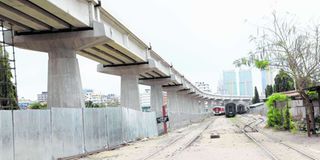China’s debt grip on African nations might lead to default wave crisis

A section of the Standard Gauge Railway (SGR) under construction at Shauri Moyo in Dar es Salaam, Tanzania. Chinese lenders have financed several projects in Africa.
What you need to know:
- Chinese lenders tend to set more onerous borrowing conditions — higher interest rates, shorter maturities — than multilateral development banks.
- In April last year, Tanzania’s President John Magufuli reportedly threatened to cancel a $10 billion project launched by his predecessor over Chinese funding conditions.
The pandemic is confronting highly indebted poor countries with a fateful dilemma. As Ethiopian Prime Minister Abiy Ahmed, a Nobel Peace Prize laureate, lamented last April, leaders are forced to choose if to “continue to pay toward debt or redirect resources to save lives and livelihoods”.
If it’s the latter, they often turn to China, Africa’s biggest bilateral lender.
According to Ahmed, a moratorium on debt payments was essential to enable Ethiopia to respond to Covid-19. It would save Ethiopia, one of the poorest countries, $1.7 billion (Sh170 billion) between April and December last year, and $3.5 billion to the end of 2022. An effective response would cost $3 billion.
A debt moratorium did save Angola. Along with Chad, the Republic of the Congo, Mauritania, and Sudan, it was under severe financial pressure, owing to the collapse in commodity prices triggered by the Covid-19 crisis.
In September, it secured a deal with three of its major creditors — including the China Development Bank (CDB), which it owes $14.5 billion, and the Export-Import Bank of China (EximBank), owed $5 billion — for a $6.2 billion debt relief over the next three years.
Last October, Zambia missed a $42.5 million interest payment on a dollar-denominated bond and was on the brink of defaulting on its $12 billion foreign debt, half of its GDP. CDB deferred interest and principal repayments to April and EximBank suspended payments on its $110 million sovereign loans.
The EximBank deal was within the G20’s Debt Service Suspension Initiative (DSSI), under which 73 of the poorest countries can request temporary respite from bilateral debt repayments. So far, 46 countries — including Angola and Zambia among the 31 in Africa — have made DSSI requests.
Some 70 per cent of the affected payments — about $8 billion — are owed to China, which holds 62 per cent of Africa’s official bilateral debt. Since the 2008 global financial crisis, China has steadily ramped up its direct lending to developing countries.
For the 50 most indebted recipients, the average debt has increased from less than one per cent of GDP in 2005 to more than 15 per cent in 2017.
Serious risks
This carries serious risks. For starters, Chinese lenders tend to set more onerous borrowing conditions — higher interest rates, shorter maturities — than multilateral development banks. In April last year, Tanzania’s President John Magufuli reportedly threatened to cancel a $10 billion project launched by his predecessor over Chinese funding conditions that “only a drunkard” would accept.
Most of China’s bilateral lending is by policy banks and State-owned commercial banks, which operate as legally independent entities. So, unlike the Paris Club of major sovereign creditors, they often require collateral for development loans — 60 per cent of their lending to developing countries. When a country applies for debt relief, its Chinese creditors can claim assets held in escrow.
Because of their murky status, Chinese banks tend to renegotiate sovereign loans bilaterally and in secret.
hat was true of Zambia’s agreement with the CDB. China insisted that the suspension of debt-service payments took place “on a voluntary basis and according to market principles.”
China does not bear sole responsibility for this situation. It was the failure of other lenders to provide adequate funding — especially infrastructure investment — that drove many poor countries into the creditors’ arms.
African countries often cannot afford to build the infrastructure they desperately need to support their growing populations. Moreover, they lack access to international capital markets and banks. In 2017, the Paris Club accounted for only five per cent of public and public debt in Sub-Saharan Africa.
Chinese lenders extend loans to African countries without demanding much of governance reforms and anti-corruption measures. The result has been projects that are bound by draconian lending conditions and unlikely to produce decent returns.
Debt moratoria during the Covid-19 crisis may offer poor countries temporary respite, freeing up funds for the pandemic response.
But they will not solve these countries’ debt problems. On the contrary, the end of the moratoria could trigger a wave of synchronised defaults, requiring the International Monetary Fund (IMF) and other multilateral institutions to intervene.
To address these debt risks sustainably requires a new international framework. New US President Joe Biden should lead the way.
Ms Subacchi, professor of international economics at the University of London’s Queen Mary Global Policy Institute, is an author. © Project Syndicate. www.project-syndicate.org




